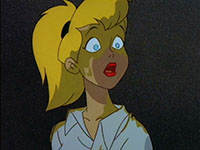 |
And
She's Not Even a Real Blonde
Posted:
October
10, 2002
 Originally
created by Paul Dini as a one-shot henchwoman for
the Joker, Harley Quinn is a cautionary lesson in the way that powerful
imagination can upend established conceptions. Everyone else in Gotham takes
a cue from the Dark Knight. But Harley is like the contract player who defies
the studio’s tastemakers and seizes control of her own destiny, on
screen and off. At the end, I wonder if she didn’t decide to swap red-and-black
diamonds for red-and-white stripes and forge an independent career as .
. . Jingle Belle? At any rate,
her striking refusal to take Gotham on any but her own zany terms, I hope,
justifies my own eccentric treatment of her eccentric career.
Originally
created by Paul Dini as a one-shot henchwoman for
the Joker, Harley Quinn is a cautionary lesson in the way that powerful
imagination can upend established conceptions. Everyone else in Gotham takes
a cue from the Dark Knight. But Harley is like the contract player who defies
the studio’s tastemakers and seizes control of her own destiny, on
screen and off. At the end, I wonder if she didn’t decide to swap red-and-black
diamonds for red-and-white stripes and forge an independent career as .
. . Jingle Belle? At any rate,
her striking refusal to take Gotham on any but her own zany terms, I hope,
justifies my own eccentric treatment of her eccentric career. She debuted in "Joker’s Favor" as peripheral comic support, a line she continued to fill in "Almost Got ‘Im," "The Man Who Killed Batman" and "The Laughing Fish." With the last came the first hint of something special in her relationship with the Joker. She stood up to him as a comic foil, and not only survived but made him look good—the kind of favor any comic (even a psychotic one) must be grateful for. Also, we got the first hint that she afflicted the Joker with love—the promise of more mayhem. But her great stroke at independence came in "Harley and Ivy," which elevated her from support to co-star status, and which by separating her from Mr. J showed she was not just a piece of his world. Nor did she herself really need support; the "Thelma and Louise" conceit notwithstanding, the pairing with Poison Ivy does not really work. The great discovery was Harley herself. A star had been born.
She was lost in the chorus line of baddies high-kicking their way through "Trial," but came completely into her own with two big starring vehicles. In "Harlequinade" she’s the key to the plot, and her attitude dominates the story as she bounces around like Tigger and humiliates every male in the episode. Then in "Harley’s Holiday" she played the female lead in a Preston Sturges–like screwball farce, spinning out so much zaniness—and catching so many others up in her spirit—that she leaves poor Batman looking like he’s wandered onto the wrong sound stage. Indeed, "Holiday" counts as a BTAS episode only on sufferance and plays more like the pilot for a nearly-imagined spinoff series: Harley Quinn Is Making Whoopee, perhaps?
Thereafter, it became clear she would either dominate a vehicle or be wasted in it. She teamed again with Ivy for one of the segments in "Holiday Knights"; and she was wisely kept in the background during the grand heroics of World’s Finest—if she had not been in it, would she have been missed; if she had been in it more, might she have spoiled it? Meanwhile, in "Beware the Creeper" she was only one more wacky element in an ersatz-Freakazoid ep. And the line of fake Harleys in "Joker’s Millions" cleverly spoofed what she had once been, but it also warned of what she might again become: a funny sidekick, there for a laugh and nothing else. That threat was made palpable in "Girls’ Night Out," which could do nothing better than give her a big hammer to whack at things with.
Her last starring part came in "Mad Love,"a game attempt by its authors to adapt their great comic. In that very tricky book, Dini’s story feinted at depth while Bruce Timm’s gleeful pop pictures kept us firmly on the sugar-frosted surface. But the animated adaptation wobbles in tone, and the nearer it comes to true exploration, the closer it comes to capsizing its heroine. Harley’s uniqueness lies in her inability to truly introspect; Gotham’s other denizens are entirely self-occupied, but Harley aims outward. That is why she can slip its dour gravity.
She was briefly in Return of the Joker, with a death scene that darkened the tragedy and a resurrection that lightened the ending.
Some claim that Harley exists in real life, as her voice actress Arleen Sorkin. Fanboys know she exists, all right, but also know it’s on that rarefied plane where imagination can clutch at but hardly contain: the realm of authentic and complete literary creation.